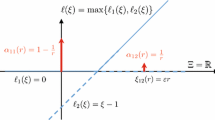Abstract.
A central result in the rational learning literature is that if the true measure is absolutely continuous with respect to the beliefs then, given enough data, the updated beliefs merge with the true distribution. In this paper, we show that, under absolute continuity, weak merging occurs fast (at the rate ) with density one. Moreover, if weak merging occurs fast enough (at the rate 1/t) then absolute continuity holds. These rates are sharp. We also show that, under some conditions, if weak merging occurs at the rate then absolute continuity holds.
Similar content being viewed by others
Author information
Authors and Affiliations
Additional information
Received: August 1997/Revised version: November 1998
Rights and permissions
About this article
Cite this article
Sandroni, A., Smorodinsky, R. The speed of rational learning. Game Theory 28, 199–210 (1999). https://doi.org/10.1007/s182-1999-8371-x
Issue Date:
DOI: https://doi.org/10.1007/s182-1999-8371-x




